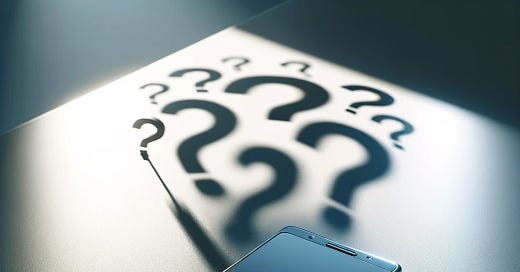Smartphone Rejection and Bad Middos
What expanded smarphone bans might tell us about Jewish communities
First, before we dive into the fun stuff, a quick update. I just published an article on The Audit that’s focused on the recent shutdown of Canada’s shechita industry. Some of you might find that interesting.
Ok. Back to business. Although today’s “business” will be unlike most of what I’ve written here. Normally, I’ll try to back up my thoughts with hard primary sources or at least statistical data. I’m not convinced that my unsupported opinions are useful or interesting enough to present on their own. This time, however, there’s a topic for which I’ve found no precedent (except other stuff I’ve written). It’s about smartphones and religious life.
Well, not about smartphones and religious in general. Lots of people have written about that. And I think there’s already widespread agreement that smartphones can be abused in ways that - particularly but not exclusively among kids - can cause significant harm.
I’m also not referring to the negative effects of “smartphone coercion” on community stability and integrity. That’s something I’ve already written about. drawing evidence from no less an authority than Israel’s Central Bureau of Statistics.
What I do want to discuss here is “smartphone virtue signalling.”
I can understand demanding that parents get rid of their smartphones when their kids are enrolled in your yeshiva. I may not agree with the underlying goals - and inspiring a smartphone “black market” may not be particularly healthy - but attempting to isolate your students from risks and influences isn’t totally irrational.
What I can’t understand is the growing trend to ban smartphone owners from entering specified shuls and batei midrash - even when their phones are turned off. What’s the goal here?
Do they believe that they possess a holiness that’s so fragile it might shatter if a hated electronic device comes too close?
Do they believe smartphone owners are so impure that their mere proximity can cause spiritual damage?
Do they believe their bans are teaching “Torah-true” values and successfully spreading their ideology among opponents?
I certainly can’t read minds, so it would be foolish of me to draw firm conclusions about why people do things. But this at least feels like conspicuous virtual signalling - where one’s actions are designed to project (“signal”) a virtue in the service of social validation. Worse, it feels like isolationism.
What’s so bad about that?
Consider the educational consequences. If you’re raised in a community that believes you can’t engage with the world around you because the people who live there are טמאים ומושחתים, how likely is it that you’ll grow up treating them with respect? Isn’t it more likely that you’ll look at “freiya,” and “modernisha” as subhuman “untouchables”?
One more thought. No community gets everything perfect. We can all improve. And in a world that’s constantly changing, the need to intelligently address new challenges becomes all the more urgent. But if you’re convinced that your community has a permanent monopoly on the truth and that you’re surrounded by טמאים ומושחתים, then you will probably lack the basic psychological capacity to change and grow.





When I was using my smartphone outside a shul, quite a fee bochrim walked by and tsktsked. I was shocked at their chutzpah. But I get it.
Well, a common chatachteristic of ALL religions is the hatred and contempt for the other abd fir independent and free thought. Judaism is no different. אתם קרואים אדם... ועל זו הדרך.